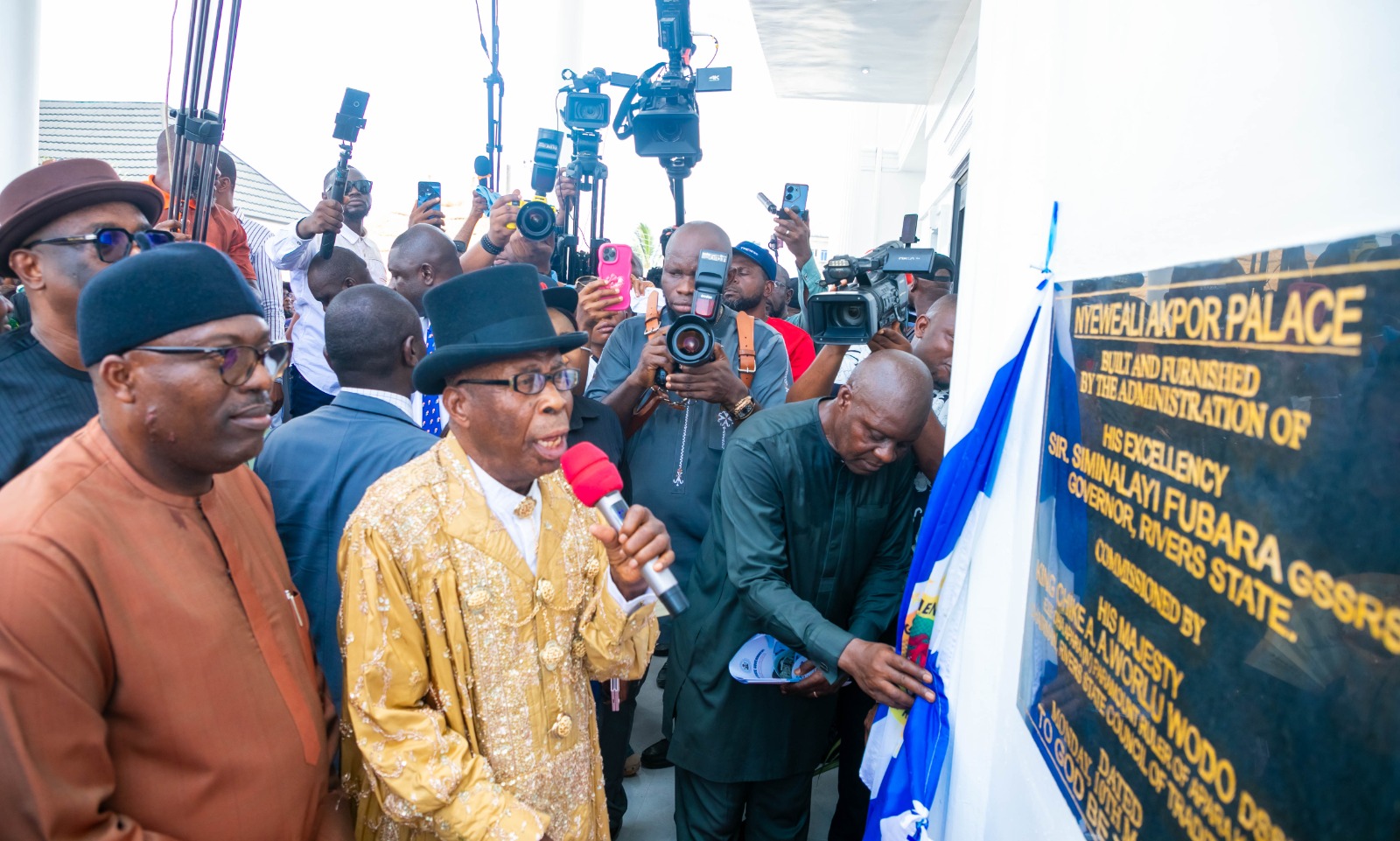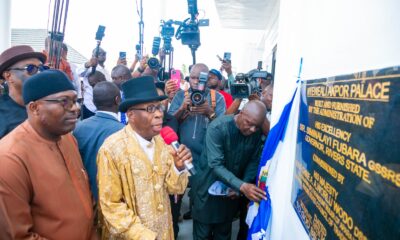News
Army Destroys Illegal Refineries In Rivers, Abia
Troops of two divisions of the Nigerian Army have uncovered and destroyed a massive illegal refinery in Okoloma, Oyigbo Local Government Area of Rivers State and Umuahale area in Ukwa West LGA of Abia State.
The discovery of the refineries was made during an operational visit led by the General Officers Commanding, 6 Division, Major General Jamal Abdussalam and his counterpart in the 82 Division, Major General Hassan Dada.
This was contained in a statement issued in Port Harcourt, yesterday, by the Acting Deputy Director, 6 Division Army Public Relations, Lieutenant Colonel Jonah Danjuma and sent to newsmen.Refineries In Rivers, Abia
The statement said the raid was part of efforts by the Army to put an end to the menace of illegal oil bunkering in the Niger Delta and South East regions of the country.
The statement reads, “The General Officers Commanding 6 and 82 Divisions, Nigerian Army Major General Jamal Abdussalam and Major General Hassan Dada, jointly paid an operational visit to the illegal oil bunkering empire located at Okoloma, Oyigbo Local Government Area and Umuahale area in Ukwa West LGA in Rivers and Abia States respectively.
“The locations are at the fringes of the Imo River, where the two Divisions are jointly conducting clearance operations from Rivers and Abia States.
“The visit was essentially to have an on-the-spot assessment of the illegality perpetrated by criminals and economic saboteurs as well as boost troops’ morale for a job well done. It was a follow-up to the earlier raid on one of the camps last week by troops of the 6 Division.
“While at the fringes of the Imo River, deep into the thickly forested areas, the GOCs were conducted through a tour by the Commander, 6 Division Garrison, Brigadier General Edet Effiong and Commander 14 Brigade, Brigadier General Olusola Diya.
“They saw the hub of illegal oil bunkering, shrouded with cooking pots, boilers, surface reservoirs and huge quantities of illegal products in dug-in reservoirs carefully concealed, under the thick forest with interconnected pipes spanning several kilometers.
“The crime scene points to the fact that it is an organized crime that has been running for a long period, owing to the huge investment made to sabotage the national economy.
“The GOCs who jointly addressed the troops charged them to ensure that all illegal bunkering sites are destroyed.
“They also re-echoed President Bola Tinubu’s directive on zero tolerance for illegal oil bunkering, charging troops to sustain the operational tempo against this mindless criminality.”
The GOCs, the statement continued, said if the illicit activity is allowed to continue, it will affect the Nigerian economy gravely.
“Additionally, it is believed that the proceeds from these illegalities are used to fund other crimes.
“Therefore, all hands must be on deck to deny the enemies of the state freedom of action and ensure that these streams of funding are completely dismantled.”
The Nigerian National Petroleum Company Limited (NNPCL) said it has in the past weeks uncovered no fewer than 83 illegal refineries in the Niger Delta.
The NNPCL disclosed this on its X handle, adding that 15 illegal pipeline connections were also discovered within the same period.
“In the past week, 15 illegal pipeline connections and 83 illegal refineries have been uncovered in the Niger Delta,” the NNPCL said.
According to a video shared with the post, it was disclosed that between January 6 and 12, a total of 211 incidents of oil theft and vandalism were reported.
Seven cases of vandalism were recorded including a wellhead in the Umuajuloke community in Rivers State.
In Owerri, it was said that an active wellhead was found with several illegal connections.
It was also learnt that nine cases of oil spills were recorded in the week, mostly caused by vandalism, adding that Ogboinbiri in Bayelsa State has been ruined by oil spills.
News
Fubara Urges Rivers People To Remain Peaceful, Law-abiding …As Eze Worlu-Wodo Inaugurates Palace For Akpor Kingdom

Rivers State Governor, Sir Siminalayi Fubara, has said that despite the ensuing political circumstances against his administration, Rivers people will emerge stronger, eventually, urging the people to remain peaceful and law-abiding in the overall interest of the State.
The Governor, therefore, urged his teeming supporters, and indeed, well-meaning Rivers people, not to be disheartened by recent turn of events but rather cheer up, knowing that God does not start a thing by enthroning his administration, and allow it to be truncated half-way in the journey.
Governor Fubara spoke at the inauguaration of the Palace of Nyeweali Akpor Kingdom and a magnificent residential quarters for the King, Eze Levi Amos Oriebe, built and furnished by the administration of Governor Fubara at Ozuoba in Obi/Akpor Local Government Area last Monday.
The Governor pointed to the ungodly motive of those who are pushing to disrupt governance by worsening the feisty political relationship, and insisted that his path will remain ensuring peace, and warned against any act of lawlessness.
He said: “I want to say to our teeming supporters, I know some of you; your spirits are high, some of you, your spirits are low. But, I want to assure you one important fact of life: God does not start a thing and end halfway.
“It doesn’t matter what the situation might be today, I assure you that we will come up again stronger and better. Continue to follow my footstep, and that footstep remains, the path of peace. We need it because if anything happens, we are the greatest losers.
“Our concern for this State is not because of our own profit, but the total well-being of Rivers State. So, I appeal to everyone of you: be law abiding. I will not encourage any act of disobedience or any act of violence. But that is not to say that we will support evil. We will never support evil.”
Governor Fubara said his administration is focused on good governance and will not renege on the promise of delivering impactful, people-oriented development projects, continually.
The Governor stated: “Our projects, our services will continue to be those ones that would touch the hearts, the souls, and the spirits of our people. And we will not, no matter the circumstances surrounding our situation, renege on that promise that we made to the good people of Rivers State.”
Commenting on the project, Governor Fubara considered it historic to have delivered a befitting palace for the Akpor Kingdom, being the first in over 200 years of its existence.
Governor Fubara explained that it was 10 months ago, during the flag-off of reconstruction work on the Okania-Ogbogoro Road project that he promised, in response to a request by the people, to build the palace, which has been achieved six months after it was awarded for construction.
The Governor said: “I was really touched to the point that I had a few drops of tears when the Royal Father was speaking, and he said, ‘for over 200 years that the Akpor Kingdom has existed, it functioned without a palace’.
“But, God doesn’t make mistakes. Maybe, He left it for our administration to fulfill so that we will be part of history forever and ever in Akpor Kingdom.”
Governor Fubara said further: “We did not just build the palace, but we also provided a personal residence for the Nyeweali, knowing fully well that the palace belongs to everyone, but at the end of his tenure or when call of nature comes, his family definitely, will not be here.
“So, after living in a fine beautiful place, what happens to the family? We have to provide a place for him. I want you to note that we did not end this project by building just the palace, but we went further to provide the Eze his own personal residence, so that when he leaves, he can enjoy the comfort that he is already enjoying here at this moment.”
Governor Fubara expressed appreciation to Akpor people for the Chieftaincy title of “Eze Omenma 1 of Akpor Kingdom bestowed on him by the Nyeweali Akpor, assuring that he will defend it wholeheartedly while urging the entire Obio/Akpor people who have remained very supportive to know that they fill strategic place in his administration.
Performing the inauguaration, Eze Oha Apara (IV), Paramount Ruler of Apara Kingdom, His Majesty, Eze Chike Amadi Worlu-Wodo, recalled that a few months ago, he benefitted from the administration of Governor Fubara, a magnificent palace built for the Apara Kingdom.
Eze Worlu-Wodo, who is also the Chairman, Rivers State Council of Traditional Rulers, explained why the government is spending so much money to build palaces for traditional rulers, saying it understands that traditional rulers are closest leaders to the people.
He said: “Traditional rulers play vital roles in maintaining peace and orderliness in the communities, and by so doing, they Simplify governance at the State level.
“My friend and colleague from Calabar once said that respect for traditional rulers and elders shows good upbringing. Our Governor has good upbringing.
“I am glad to be here, Your Excellency, to witness your display of goodwill, respect and good intention for the traditional institution. Your Excellency, you have done well, and I must say, we are all proud of you.”
Eze Worlu-Wodo acknowledged the numerous developmental projects executed by the administration of Governor Fubara across the State, and urged him not to be worried by recent political developments in the State.
The Royal Father said: “God is in charge of this State, so, the machinations of the evil ones will not succeed in this State.”
Providing the project description, Rivers State Commissioner for Special Projects, Dr Rowland Obed-Whyte, said the construction was awarded in August, 2024, and the work completed in six months.
He added, “The palace complex is on a land space of 9,000 square meters, with an electric perimeter fencing. The palace is a duplex building with two wings; right-wing having guest room for the king, a 120- person sitting capacity multipurpose hall, a 50-person sitting capacity conference hall, offices and public conveniences.
“The left-wing has the royal ranch, bar, dinning, kitchen, and laundry. Behind the palace is a royal garden, traditional meeting place (Obiri), royal car park, visitors’ lodge, water tank, and water fountain.”
News
Fubara Recommits To Wellbeing Of Rivers People
Rivers State Governor, Sir Siminalayi Fubara, has reiterated commitment of his administration to advancing the well-being of Rivers people, which is why, the Rumuodomaya Fire Service Sub-Station has been revitalised into an efficient and modern facility.
The Governor assured that with the improved status, the Fire Service Station will offer prompt response to combating fire emergencies in order to safeguard lives and the property of residents of the Rumuodomaya community, Obio/Akpor and environs.
Governor Fubara spoke at the inauguaration of the Rivers State Fire Service Sub-Station at Rumuodomaya in Obio/Akpor Local Government Area of the State, last Friday.
The Governor said he feels so excited to showcase to the world the third Fire Service Station that has been unveiled within the past few days, and initiated to make living safer for Rivers people.
Governor Fubara said: “I feel very happy again to stand before you to showcase, again, one of the things that we have done to show that the interest of our people is most important in our administration. There is nothing I want to say now that I have not said before. When we unveiled the remodelled Headquarters of the Rivers State Fire Service, I did inform you that we have two sub-stations that are attached to that. The Borokiri sub-station that we unveiled yesterday, and this particular one that we are unveiling today. The essence of this project, you already know. We have to safeguard lives of our people and the property of every citizen of Rivers State, which is the primary function of governance.”
Governor Fubara expressed appreciation to the people of Obio/Akpor Local Government Area for their unwavering support and assurances given to his administration, adding: “We can feel your support here. I want to also appreciate the support of the good people of Rivers State, who kept believing in us. We know that your trust is the right thing, and that you are standing on the side of truth. I want to assure you that we will continue to do what is right to make life better and advance the State.”
Inaugurating the project, an elder statesman, Chief Hanny Woko, said a state without a functional fire service station is partially a failed state, because its citizens will only rely on the mercy of God to combat fire incidences.
Chief Woko, who noted that the project will serve to secure lives and property within Rumuodomaya Community and environs, thanked Governor Fubara for demonstrating genuine love to Ikwerre people in particular and Rivers people in general.
He said, “We thank you for continuing governance without minding distractions all over. It’s even very important to know that in the heat of the crisis, you are still going about commissioning projects. There are projects lined up for two weeks. You have come to serve Rivers State, and be rest assured that Rivers people will protect this democracy and protect you. There is no pretense about it: the love is organic, and we will make sure we continue to support you.”
Chief Woko stated further that Ikwerres are grateful to Rivers people who supported them to serve as governors for 16 unbroken years, stressing that it is only proper that Ikwerre people support other tribes, particularly Governor Fubara, to serve his tenure without truncating it.
He said, “Equity and fairplay demand that we allow our Ijaw Ethnic Group to serve out their tenure. Be rest assured, Your Excellency, that you have the support of the Ikwerre Ethnic Nationality. I want to use this opportunity to call on every reasonable Rivers son and daughter to know, there should be an end to every conflict. Rivers State has been, always, in the news for the negative reasons, and we condemn that.”
Chief Woko stated: “We should borrow a leaf from our sister states, like Lagos. The Governors are ruling, and governing their people. There is no friction anywhere. Yes, in human relations, there may be room for friction, there may be room for quarrel, but the most important thing is to put the state first. No personal interest should override that of the collective interest of the state.”
Providing the project description, Rivers State Commissioner for Duties, Dr Samuel Anya, said the Rumuodomaya Fire Service Sub-Station was abandoned shortly after it was built by the administration of Chibuike Amaechi, explaining how Governor Fubara ensured the sub-station became functional with the structures rehabilitated, providing 54 offices, staff quarters, brand new fire trucks, and water tank of 45,000 litres.
In his address, Head of Local Government Administration of Obio/Akpor Local Government Area, Mr Ichechi Amadi, said the rehabilitated structures and newly purchased fire trucks will motivate personnel and improve their response capacity to fire incidences that had, hitherto, destroyed lives and property worth billions of naira for years.
News
Reps urge CBN to suspend increase in ATM withdrawal charges
The House of Representatives has urged the Central Bank of Nigeria (CBN) to suspend its directive increasing ATM withdrawal charges.
This resolution was taken as a result of a motion on urgent national importance moved by Rep. Marcus Onobun (Esan Central/West/Igueben Federal Constituency, in Abuja last Tuesday.
Onobun said that additional ATM withdrawal charges would further limit the financial inclusion of Nigerians by discouraging low-income earners from accessing banking services.
He said that Nigerians were already grappling with multiple economic hardships, including high inflation, increased fuel prices, electricity tariff hikes, and numerous banking and service charges.
The lawmaker warned that an increase in ATM withdrawal charges would be a contradiction of the CBN’s financial inclusion agenda.
“Aware that CBN in its new circular, has reviewed the ATM transaction fees stipulated under Section 10.7 of the CBN Guide to Charges by Banks, Other Financial and Non-Bank Financial Institutions.
“Prescribing an increase in ATM withdrawal charges and a discontinuation of the free ATM withdrawals for customers using other banks’ ATMs.
“Thereby imposing additional financial burdens on Nigerians.
“Also aware that the said Section 10.7 of this Guide was last reviewed in 2019.
“Reducing ATM transaction fees from N65 Naira to N35 per transaction,” he said.
The Speaker, Rep. Tajudeen Abbas and the entire House adopted the motion, thereby urging the CBN to suspend the increase in ATM withdrawal charges.
-

 News2 days ago
News2 days agoFubara Urges Rivers People To Remain Peaceful, Law-abiding …As Eze Worlu-Wodo Inaugurates Palace For Akpor Kingdom
-
Business2 days ago
IWD: DBN Disburses N272b To Women Businesses
-

 Niger Delta2 days ago
Niger Delta2 days agoNACA Debunks Fake HIV Drug Pricing News
-
Business2 days ago
MDAs, Presidency Spend N1.9bn On Trips, Trainings In France
-
Politics2 days ago
You’re Democratic Accountability Agents, Diri Tells Journalists
-

 Featured2 days ago
Featured2 days agoWe’ll Comply With Supreme Court Judgement, Fubara Assures …As CJ Inaugurates Judges’ Quarters
-
Business2 days ago
Coy Launches $2m Fund For Nigerian Entrepreneurs
-
Sports2 days ago
RFF Announces 15 Players For African Games

